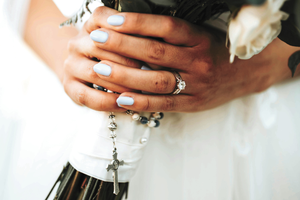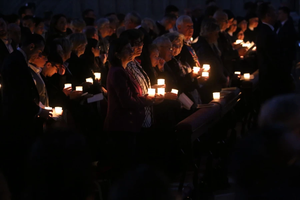Finding the Faith at a Non-Catholic College
The richness of the Catholic faith can be encountered at some of the nonsectarian Christian liberal arts schools around the United States.

At a glance, this scene might look like a typical Catholic college campus. Students read Aquinas for multiple classes, pray the Rosary on the sidewalks, and have deep theological conversations daily.
But this is not a Catholic college campus.
The richness of the Catholic faith can be encountered at some of the nonsectarian Christian liberal arts schools around the United States.
“We think the liberal arts help you seek wisdom and think through some of the most important questions of what it means to be human and love God,” said Michael Coulter, a Catholic professor of political science and humanities at Grove City College, a Christian liberal arts college in Grove City, Pennsylvania.
Coulter, who is also an alumnus of Grove City, said the college, though nondenominational (and previously Presbyterian), is “quite open” to Catholicism.
“Most students are reading Augustine and Aquinas for the first time, and it’s a point of entry to Catholic theology more generally,” Coulter said.
Such classical curriculum harkens back to the famed decade-long University of Kansas Pearson Integrated Humanities Program (IHP) in the 1970s, spearheaded by professor John Senior, a Catholic convert, and boasting alumni like Bishop James Conley of Lincoln, Nebraska, and Archbishop Paul Coakley of Oklahoma City.
While students at Grove City read doctors of the Church in the classroom, many encounter it through the witness of Catholic students and theological discussions.
“Grove City is a place where questions are respectful, and they come from a place where they’re serious, not insulting, but earnest questions,” Coulter said.
Members of the Catholic community attend church and the Newman Center, and they bond with each other and their Catholic professors, including frequent Register contributor Paul Kengor, over their shared faith.
Father Nick Clinton, a priest of the Diocese of Pittsburgh, graduated from Grove City in 2017 and was ordained in June. Father Clinton said the conversations he had with Protestant classmates challenged him to research his faith and fall more in love with it. He said he would not be a priest without Grove City.
“The humanities core really opens your eyes to the truths of the faith throughout the Church because Western civilization would not have happened without the Church, and it’s hard to teach it otherwise,” Father Clinton said.
The truth-seeking attitude of Grove City, in the mode of St. John Henry Newman, has also led students to convert to Catholicism.
John Kalajian enrolled at Grove City as a Protestant and graduated in 2020 as a Catholic. While a freshman studying biology, Kalajian began asking his Catholic teaching assistant questions about Catholicism, leading him to research Church history and sacramental theology. He said his humanities classes complemented his Catholic faith.
“If you are a Catholic and you approach the liberal arts and the humanities from a Catholic lens, it doesn’t matter that Grove City is historically associated with a Calvinist and evangelical atmosphere — you’ll be surprised,” he said.
Melinda Nielsen, now associate professor of classical literature at Baylor University’s Honors College, attended Hillsdale College in Michigan for her undergraduate degree, which led to her conversion to Catholicism.
Growing up evangelical, Nielsen said she encountered enchantment and heroism in the writings of J.R.R. Tolkien and the Inklings, of which C.S. Lewis was also a member, that didn’t seem to exist in her real-life experience — until she came to Hillsdale.
“Through the ‘Western Heritage’ course and the Great Books I read at Hillsdale, I came face-to-face with the fact that, at one point, it seemed like it did exist, and it existed in the Catholic Church,” Nielsen said. “Faculty members had so much incredible charity, joy and willingness to live a different life than suburban Americans typically do, which made it appear that it wasn’t just something historical, once in the past, but a historical reality still in the present.”
Nielsen said she has seen Catholics and other Christians at Baylor’s Honors College grow in their faith because of their interactions with professors. Baylor’s Honors College, according to the Texas university’s website, “provides a close-knit community of extraordinary talent, much like you would find at any elite national liberal arts college.” It includes four programs, including “Great Texts,” “University Scholars” and the “Honors Program,” which explore the great thinkers of the Western Tradition.
“I think there is a really compelling encounter that students have in the humanities at good liberal arts schools, whether it’s with Catholic faculty members, or atheistic faculty members, or something in between — discovering reality, with its beauty and goodness, and then ultimately wanting to be a part of that,” Nielsen said.
Annie Jo Piet is a senior at Baylor in the University Scholars program. She said she has seen her faith grow through St. Peter Catholic Student Center and the program’s curriculum.
“We’ve read Aquinas, St. Julian of Norwich and Augustine’s Confessions, and I’ve felt more connected to the authors because they believe a lot of the same things I believe in,” Piet said.
Piet also said she’s encountered students of other denominations who ask thoughtful, in-depth questions about Catholicism.
“It causes you to reflect and ask yourself the same questions,” she said. “I’ve grown a lot in being committed to my faith and being proud to be Christian and Catholic.”
Khalil Habib, associate professor of politics at Hillsdale, said the liberal arts tradition emphasizes “philosophical inquiry, ethical reflection, and the exploration of diverse fields of knowledge,” which together demonstrate the compatibility of faith and reason.
“Ultimately, a liberal arts education ought to inspire a holistic view of the world and encourage students to engage with enduring questions about truth, beauty and goodness,” Habib said.
“This educational experience resonates deeply with the Catholic intellectual tradition, which seeks to integrate all aspects of human knowledge and experience in the light of faith.”
- Keywords:
- catholic college students
- college campuses
















